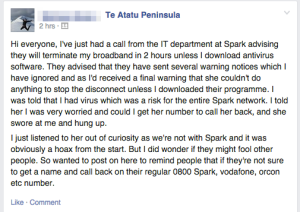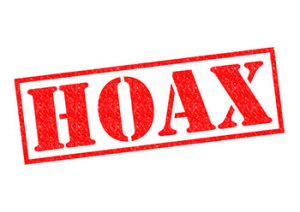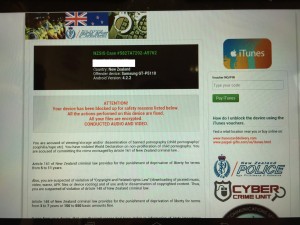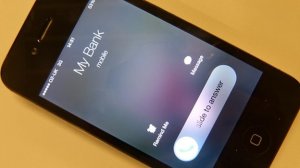Author: sarahkadmin
A new Computer Support Scam – don’t call (09) 280 6231
I reviewed a site today and discovered a new advertising technique – and if it’s on one site, it’ll be on plenty more.
I clicked on a menu option and instantly got a popup telling me I had the “blue screen of death” and giving me a number to call. It disabled my ability to close the window and I needed to use the task manager to close it down.
Out of curiosity I rang the number (09) 280 6231 which was answered with a bland “Computer Support” and when I tried to find out more about the company I was told it was a large international company and I’d come through to their main support desk – with an Auckland number, yeah, right!Continue reading
The IRD like cold hard cash
Stuff have an article about a scam involving iTunes vouchers.
$8000 in iTunes to pay tax? iDon’t think so
The scam plays out like this
- Phone rings, it’s the IRD, you owe us mega bucks and there’s a warrant out for your arrest
- Pay us in iTunes vouchers to make this problem go away
- Victim buys vouchers
- Victim phones back with the codes
Don’t be a mug – anyone who wants to be paid using something other than actual money is a con. Go to the Police. Even if there is a warrant out for your arrest it’s far better, and safer, to go through that rigmarole than to risk being sucked in.
Be the good guy – If you are in a shop and you see someone buying a bundle of these have a chat with them. Maybe they have 80 grandchildren and they’re generous, but it’s far more likely that they’re being scammed.
The cops aren’t blocking your device
It isn’t immediately clear why someone would get this message on their phone but it’s clearly trying to pretend it’s an instant fine payable with iTunes vouchers. Check out the message from the Te Awamutu Police.
Don’t send money/vouchers/gifts. Call your local police station and offer your device for forensic investigation so that the cops can answer the “how” and “who” questions.
Buy a game for me, will you?
 There is a new scam in town where people befriend young men, primarily, and ask them to purchase a game using PayPal.
There is a new scam in town where people befriend young men, primarily, and ask them to purchase a game using PayPal.
The so-called “friend” deposits money into the PayPal account, the game is purchased, the licence codes handed over and then the “friend” issues a chargeback with PayPal. The “friend” now has his money back and can sell the licence codes for the game to somebody else.
The young man now has a negative balance and PayPal and, because of his age, he can’t report this to PayPal because he has opened account fraudulently. If he doesn’t pay the money back there are long term ramifications regarding his credit history and his ability to get finance in the future. The consequences are potentially far-reaching.
The new NZBOL is not the old NZBOL!
This blog has suddenly been woken from the dead by someone called Te Ma’imi purporting to be legal counsel for a chap called Alex Savage who runs a directory called NZBOL.
I wouldn’t normally create a page for Alex Savage because he’s done nothing to attract attention with his directory but as his counsel is claiming I’ve slandered him I feel I need to have my information in one place.
Let’s create a timelineContinue reading
Phishing by Phone
The BBC website has an article on “number spoofing” being used in phone based scams to get private info.
This could well be happening in NZ already! I frequently have my home line forwarded to my mobile and there have been numerous times when I’ve tried to return a missed call and the number doesn’t exist. Or when one of my kids has taken a call and I’ve tried to call back because the message they’ve taken hasn’t made sense.
When I was a kid I was taught that if you are unsure about anyone’s identity find out who they are and then look up their phone number, call and verify if they are meant to contacting you. The context we were given was fake policemen, but the rule works for any kind of faker!
If you take a call and are dubious ask for their extension but find the phone number yourself and call them back.
More Hoax Calls – this time “from” Spark
 Any phone call you get from your Internet Provider (ISP) should verified if they are saying anything even remotely dubious. Call them back on their publicly listed phone number, not one given by the caller.
Any phone call you get from your Internet Provider (ISP) should verified if they are saying anything even remotely dubious. Call them back on their publicly listed phone number, not one given by the caller.
In this latest scam they’re inciting fear from regular people by pretending that their access will be terminated if they don’t download some software. No prize for guessing that the software will be anti anti virus, right?!
While you should have anti virus software running it is not for your ISP to dictate which anti virus software you should use.
I’m calling from “Windows”
 By now most people I know are familiar with the caller who claims to be calling from “Windows” and wants them to remove security files from their computer. There is a set script and over the years the only time I’ve found that they waver from it is when goaded – although the smart ones just hang up and move to the next number.
By now most people I know are familiar with the caller who claims to be calling from “Windows” and wants them to remove security files from their computer. There is a set script and over the years the only time I’ve found that they waver from it is when goaded – although the smart ones just hang up and move to the next number.
We’ve had a number of these in the last few weeks and my son is getting fairly well practiced at playing along until he gets to what he thinks is a hilarious punchline. I should probably stop him but I lack the will.
Needless to say – if you get the call, don’t make any changes to your computer.
If challenged they can’t tell you which computer in the house is causing the problem, yet they have your phone number. They fail at the first hurdle.
So the question that has to be asked is who is making money out of this? Because I’ve never heard of anyone owning up to being ripped off by them (unlike the Nigerian Oil/Investment scams where the victims are reported in the news) I can only assume that those they do hoodwink are so technically unsophisticated that they don’t have important info on their computers anyway.
Which leads me to think that there is some “HotShot” out there selling a “package” to the sorts of people who are susceptible to Get Rich Quick schemes and don’t mind breaking laws in foreign lands.
They pay upfront, hire the call centre, rope in their friends and family and start making calls.
Eventually the operation fails because they simply run out of money and the HotShot is nowhere to be seen. Our phones go quiet for a while until the HotShot finds his next victim.
Faked invoice schemer appeals against sentence

Sonia Klair
Absolutely outrageous that someone who defrauds “customers” of $700,000 would have the gall to claim that 10 months home detention is “manifestly excessive”.
A woman who fleeced small businesses in a “sophisticated” fake invoicing scheme that used forged documents made in India has appealed against her sentence.
Sonia Klair, who is now living in Australia, in 2008 set up NZ Look, an internet-based directory where consumers could look up products and services.
During that year, the company began sending out documents that falsely told the recipient that they already had listings with NZ Look and invited them to sign on for another term.
The customers contacted were from a database that originally belonged to NBO, a similar business previously run by Klair and her then-husband.
From early 2010, Klair used forged documents made in India in an attempt to convince businesses they had previously signed on for NZ Look’s services.
These documents copied over customers’ signatures from NBO documents to NZ Look documents.
Klair would then send an invoice requesting payment for the listing to these “clients”.


